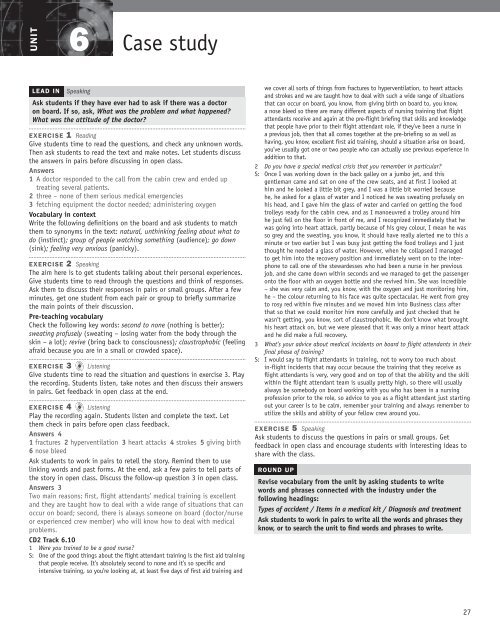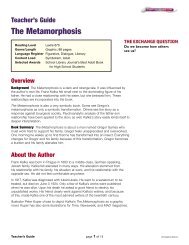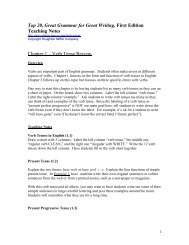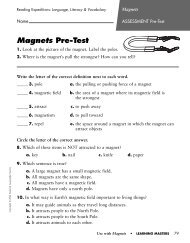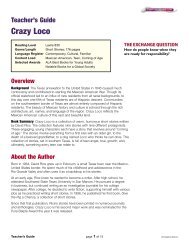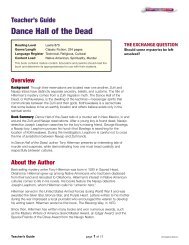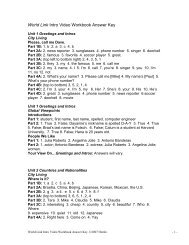English for Cabin Crew Trainer's Guide - Heinle
English for Cabin Crew Trainer's Guide - Heinle
English for Cabin Crew Trainer's Guide - Heinle
You also want an ePaper? Increase the reach of your titles
YUMPU automatically turns print PDFs into web optimized ePapers that Google loves.
UNIT<br />
LEAD IN Speaking<br />
6 Case study<br />
Ask students if they have ever had to ask if there was a doctor<br />
on board. If so, ask, What was the problem and what happened?<br />
What was the attitude of the doctor?<br />
EXERCISE 1 Reading<br />
Give students time to read the questions, and check any unknown words.<br />
Then ask students to read the text and make notes. Let students discuss<br />
the answers in pairs be<strong>for</strong>e discussing in open class.<br />
Answers<br />
1 A doctor responded to the call from the cabin crew and ended up<br />
treating several patients.<br />
2 three – none of them serious medical emergencies<br />
3 fetching equipment the doctor needed; administering oxygen<br />
Vocabulary in context<br />
Write the following defi nitions on the board and ask students to match<br />
them to synonyms in the text: natural, unthinking feeling about what to<br />
do (instinct); group of people watching something (audience); go down<br />
(sink); feeling very anxious (panicky).<br />
EXERCISE 2 Speaking<br />
The aim here is to get students talking about their personal experiences.<br />
Give students time to read through the questions and think of responses.<br />
Ask them to discuss their responses in pairs or small groups. After a few<br />
minutes, get one student from each pair or group to briefl y summarize<br />
the main points of their discussion.<br />
Pre-teaching vocabulary<br />
Check the following key words: second to none (nothing is better);<br />
sweating profusely (sweating – losing water from the body through the<br />
skin – a lot); revive (bring back to consciousness); claustrophobic (feeling<br />
afraid because you are in a small or crowded space).<br />
EXERCISE 3 Listening<br />
Give students time to read the situation and questions in exercise 3. Play<br />
the recording. Students listen, take notes and then discuss their answers<br />
in pairs. Get feedback in open class at the end.<br />
EXERCISE 4 Listening<br />
Play the recording again. Students listen and complete the text. Let<br />
them check in pairs be<strong>for</strong>e open class feedback.<br />
Answers 4<br />
1 fractures 2 hyperventilation 3 heart attacks 4 strokes 5 giving birth<br />
6 nose bleed<br />
Ask students to work in pairs to retell the story. Remind them to use<br />
linking words and past <strong>for</strong>ms. At the end, ask a few pairs to tell parts of<br />
the story in open class. Discuss the follow-up question 3 in open class.<br />
Answers 3<br />
Two main reasons: fi rst, fl ight attendants’ medical training is excellent<br />
and they are taught how to deal with a wide range of situations that can<br />
occur on board; second, there is always someone on board (doctor/nurse<br />
or experienced crew member) who will know how to deal with medical<br />
problems.<br />
CD2 Track 6.10<br />
1 Were you trained to be a good nurse?<br />
S: One of the good things about the fl ight attendant training is the fi rst aid training<br />
that people receive. It’s absolutely second to none and it’s so specifi c and<br />
intensive training, so you’re looking at, at least fi ve days of fi rst aid training and<br />
we cover all sorts of things from fractures to hyperventilation, to heart attacks<br />
and strokes and we are taught how to deal with such a wide range of situations<br />
that can occur on board, you know, from giving birth on board to, you know,<br />
a nose bleed so there are many different aspects of nursing training that fl ight<br />
attendants receive and again at the pre-fl ight briefi ng that skills and knowledge<br />
that people have prior to their fl ight attendant role, if they’ve been a nurse in<br />
a previous job, then that all comes together at the pre-briefi ng so as well as<br />
having, you know, excellent fi rst aid training, should a situation arise on board,<br />
you’ve usually got one or two people who can actually use previous experience in<br />
addition to that.<br />
2 Do you have a special medical crisis that you remember in particular?<br />
S: Once I was working down in the back galley on a jumbo jet, and this<br />
gentleman came and sat on one of the crew seats, and at fi rst I looked at<br />
him and he looked a little bit grey, and I was a little bit worried because<br />
he, he asked <strong>for</strong> a glass of water and I noticed he was sweating profusely on<br />
his head, and I gave him the glass of water and carried on getting the food<br />
trolleys ready <strong>for</strong> the cabin crew, and as I manoeuvred a trolley around him<br />
he just fell on the fl oor in front of me, and I recognized immediately that he<br />
was going into heart attack, partly because of his grey colour, I mean he was<br />
so grey and the sweating, you know, it should have really alerted me to this a<br />
minute or two earlier but I was busy just getting the food trolleys and I just<br />
thought he needed a glass of water. However, when he collapsed I managed<br />
to get him into the recovery position and immediately went on to the interphone<br />
to call one of the stewardesses who had been a nurse in her previous<br />
job, and she came down within seconds and we managed to get the passenger<br />
onto the fl oor with an oxygen bottle and she revived him. She was incredible<br />
– she was very calm and, you know, with the oxygen and just monitoring him,<br />
he – the colour returning to his face was quite spectacular. He went from grey<br />
to rosy red within fi ve minutes and we moved him into Business class after<br />
that so that we could monitor him more carefully and just checked that he<br />
wasn’t getting, you know, sort of claustrophobic. We don’t know what brought<br />
his heart attack on, but we were pleased that it was only a minor heart attack<br />
and he did make a full recovery.<br />
3 What’s your advice about medical incidents on board to fl ight attendants in their<br />
fi nal phase of training?<br />
S: I would say to fl ight attendants in training, not to worry too much about<br />
in-fl ight incidents that may occur because the training that they receive as<br />
fl ight attendants is very, very good and on top of that the ability and the skill<br />
within the fl ight attendant team is usually pretty high, so there will usually<br />
always be somebody on board working with you who has been in a nursing<br />
profession prior to the role, so advice to you as a fl ight attendant just starting<br />
out your career is to be calm, remember your training and always remember to<br />
utilize the skills and ability of your fellow crew around you.<br />
EXERCISE 5 Speaking<br />
Ask students to discuss the questions in pairs or small groups. Get<br />
feedback in open class and encourage students with interesting ideas to<br />
share with the class.<br />
ROUND UP<br />
Revise vocabulary from the unit by asking students to write<br />
words and phrases connected with the industry under the<br />
following headings:<br />
Types of accident / Items in a medical kit / Diagnosis and treatment<br />
Ask students to work in pairs to write all the words and phrases they<br />
know, or to search the unit to fi nd words and phrases to write.<br />
27


